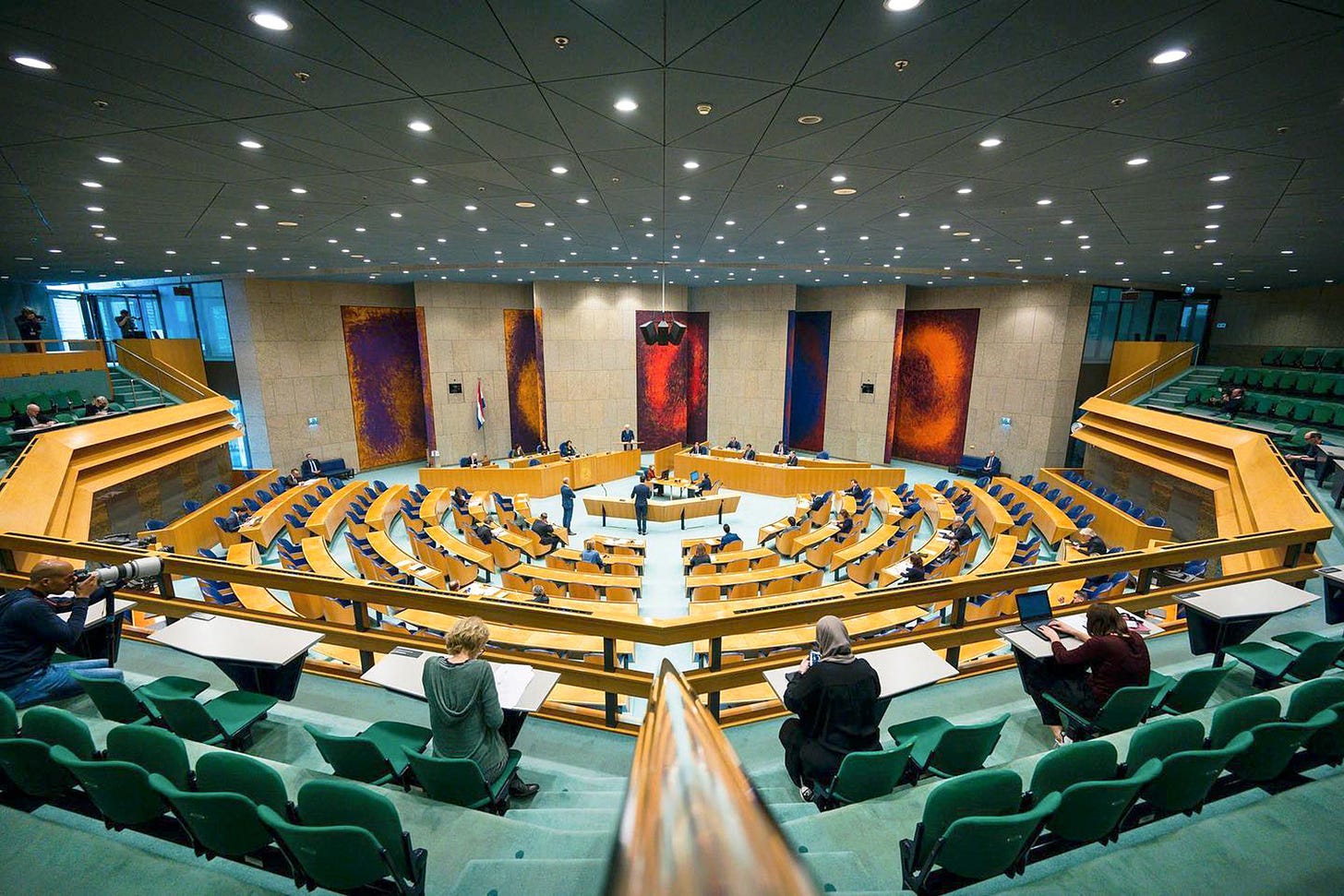Dutch Election: Takeaways and What Happens Next
A center-right government seems likely, but new parties could play a role.
Dutch prime minister Mark Rutte is on track to win reelection with projections giving his liberal VVD (of which I am a member) 36 out of 150 seats in parliament, up three.
The outcome is likely to be a center-right government of three or four parties.
If you haven’t been reading our live election blog, this explainer will get you up to speed on the results, takeaways and next steps.
Results
Results are trickling in from the Netherlands’ 355 municipalities, including the Caribbean islands of Bonaire, Sint Eustatius and Saba, where polls closed at 9 PM local time.
Rutte will almost certainly win an historic fourth term. If he remains in power 500 more days, he will surpass Ruud Lubbers as the Netherlands’ longest-serving prime minister.
The social-liberal and pro-European D66 gained, seemingly at the expense of the more left-wing Labor Party and Greens.
The Christian Democrats (CDA) lost seats for the fifth election in a row, but it would still be needed to form a government.
Support for the populist right is stable at 15-20 percent, but there were shifts away from Geert Wilders’ Freedom Party (PVV) and toward the more radical Forum for Democracy (FvD) as well as the more pragmatic JA21.
Seventeen parties are projected to win seats, including four new parties — the highest number since 1918.
Takeaways
Voters value Rutte’s pragmatic leadership. In a fragmented parliament, his ideological flexibility (the VVD has moved to the center on climate policy, the EU, government spending and labor law) is a strength, not a weakness.
D66 leader Sigrid Kaag, the incumbent foreign trade minister, impressed many center-left voters in the televised debates. She will try to pull the next government to the left on education, the environment and the EU.
The Christian Democrats were once again squeezed between Rutte, who appeals to secular, middle-income voters, and smaller Christian parties.
No three-party combination would have a majority in the Senate. The next government — like the outgoing coalition — will have to find majorities there on a case-by-case basis.
JA21, an offshoot of Forum for Democracy that fancies itself the “reasonable” right, could play a role. It has eights out of 75 seats in the Senate and is projected to win three seats in the lower chamber.
Other parties have ruled out deals with the Freedom Party and Forum for Democracy.
What happens next
Khadija Arib, the speaker of parliament, has invited the leaders of all parties that are projected to win seats to meet on Thursday afternoon in The Hague and appoint a verkenner (explorer or scout) to map out the possible coalitions.
Electoral authorities are due to announce the final results on March 26. The new parliament convenes on March 31. It will then debate the outcome and appoint one or more informateurs, who will guide the coalition talks.
Once parties have a deal, a formateur, usually the prospective prime minister, is named to form the new cabinet.
Verkenners, informateurs and formateurs were appointed by the king until 2012, when parliament assumed those responsibilities. He does still swear in members of the government.
Possible coalitions
VVD, D66 and CDA are likely to form the heart of the next government. They may eke out a majority between them. If not, the Christian Union (CU) is a likely partner. It has governed in a coalition with the larger three since 2017.
The problem is that D66 and CU are on opposite ends of debates about drug legalization and euthanasia. D66 has bit its tongue on those issues for four years. It won’t accept four more years of standstill.
Labor and the Greens could give the center-right parties a majority, but neither will want to be the only left-wing party in a government. VVD and CDA wouldn’t want both of them. Labor campaigned on massive tax hikes for businesses. The Greens, as well as D66, propose to cut livestocks in half in order to reduce greenhouse gas emissions; unacceptable to VVD and CDA.
A coalition without the VVD would require five or six parties, ranging from the Christian parties on the right to the Socialists on the far left. That is unlikely.
A right-wing coalition is numerically possible but unrealistic. CDA and VVD have consistently ruled out a repeat of their 2010-12 pact with the far right. Even if Wilders were to reverse himself on his most contentious proposals — banning the Quran, closing mosques, stripping dual citizens of their voting rights — Forum for Democracy would remain toxic.
JA21, who left Forum because of its racism and conspiracy theories, could play a role, especially when they have eight seats in the Senate. Volt, a new European federalist party, could be an ally for D66. The animal rights party is eager to govern, but probably not if the price is to vote for VVD-CDA farm policy.
We’ll know more in a few days, when the first talks get underway.



